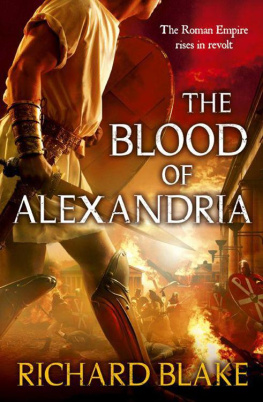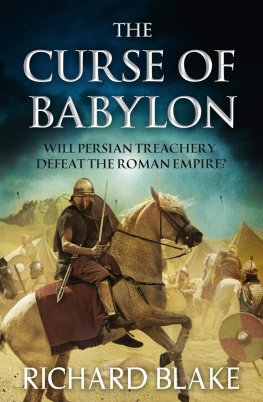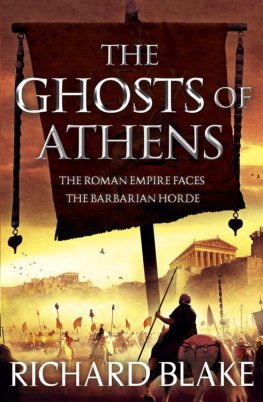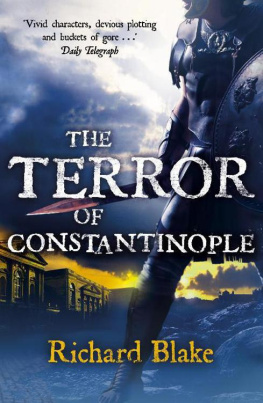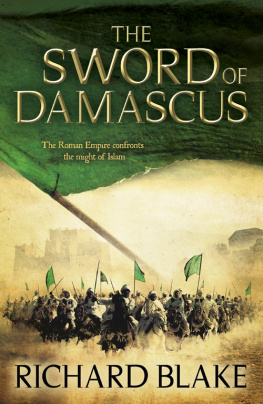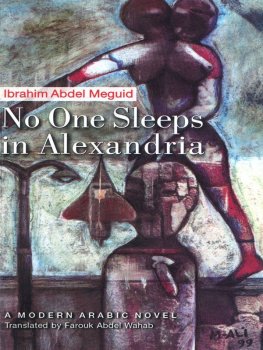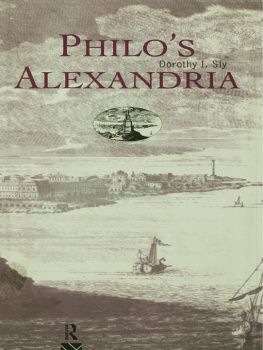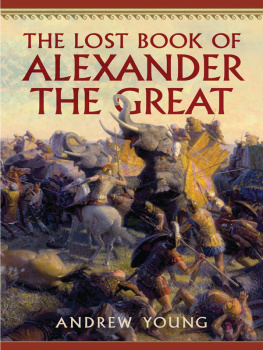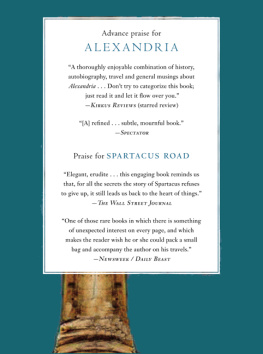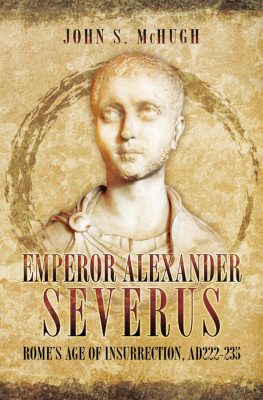CONTENTS
The Blood of Alexandria
Richard Blake

www.hodder.co.uk
By the same author
Conspiracies of Rome
The Terror of Constantinople
First published in Great Britain in 2010 by Hodder & Stoughton
An Hachette UK company
Copyright Richard Blake 2010
The right of Richard Blake to be identified as the Author of the Work has been
asserted by him in accordance with the Copyright, Designs and Patents Act 1988.
All rights reserved. No part of this publication may be reproduced, stored in a retrieval system, or
transmitted, in any form or by any means without the prior written permission of the publisher,
nor be otherwise circulated in any form of binding or cover other than that in which it is
published and without a similar condition being imposed on the subsequent purchaser.
All characters in this publication are fictitious and any resemblance to real persons, living or dead is purely coincidental.
A CIP catalogue record for this title is available from the British Library
Epub ISBN 9781444711530
ISBN ISBN 9780340951163
Hodder & Stoughton Ltd
338 Euston Road
London NW1 3BH
www.hodder.co.uk
I dedicate this novel to my dear wife Andrea, without whose support I could never have begun it, and to my little daughter Philippa, despite whose best efforts I was able to finish it.
Acknowledgements
The reference to Homer in Chapter 2 is actually from John Milton, Paradise Lost , Book I.
The verses in Chapter 7 are by the author.
The verses in Chapter 9 are from The Seafarer , an anonymous English poem of the 7th or 8th century. They translate as
Let us consider where our true home is,
And then how we may come there again.
The words ascribed to Euripides in Chapter 19 are an anonymous commonplace.
The words ascribed to Epicurus in Chapter 20 are from John Locke, Second Treatise of Civil Government , 1690.
The verses ascribed to Sophocles in Chapter 22 are by the author.
The verses in Chapter 50 are from Antigone by Sophocles, translated by Francis Storr (18391919).
The verses ascribed to Claudian in Chapter 63 are actually from John Milton, Paradise Lost , Book I.
Prologue
Jarrow, Tuesday, 21 August 686
You know, Brother Aelric, Benedict told me this morning, you may be up for canonisation.
I grunted and carried on looking at the draft manifesto one of King Aldfriths clerks had given me to correct. It was dire stuff. Latin has no aorist, and you cant use participles to supply the lack. And that was probably the most literate error.
I think the Abbot mistook my silence. He brightened his voice, adding, Of course, I would never dream of wishing you called out of this life. For all your great age, the work you do for us here makes you irreplaceable he repeated the word irreplaceable, and emphasised it but the common people are already calling you a saint.
Im now alone in my little cell, and free to think again. Benedict is a good man. Im grateful for the refuge he gave me in his monastery, no questions asked. Im particularly grateful at the moment for the stove hes had brought in to keep the afternoon chill away. If you think I was upset by his reference to the inevitable, youre as mistaken as he was. At ninetysix, that is something youve had plenty of time to consider. And Saint Aelric ! It may not make death any less of the darkness it probably is. But it does have a nice sound.
The truth is, I was cutting off any renewal of the questioning. What did happen yesterday afternoon? Everyone is itching to know. Benedict first asked just after Id been carried back here, and I lay dripping on to the polished floor of his refectory. All he got for his trouble was a blank stare. The boy who dared ask this morning got a box on the ears. But questioning by others is easily handled. The problem is that I dont myself know what happened. Oh, the generality is easy: lack of air can do funny things to the mind. The question remains, though, of the attendant circumstances. How to explain those?
Well, as Epicurus said, facts must be described before they can be explained. Before I go any further, let me here in the double privacy of this journal and of the Greek in which I keep it set out the facts as best I have them. Since what I must explain happened yesterday afternoon, I suppose it is with the facts of yesterday afternoon that I must begin.
Generally, the Northumbrian summer is shite. So it was last year, and the year before that, and the year before that. I cant speak for the year before that, as I still had my summer palace in Nicea, and rain was the least of my worries. Yesterday, though, it was almost warm. And thats what had me out for a sightseeing tour on the banks of the Tyne.
Nothing there to see ordinarily, Ill admit. Even when not hidden in mist, the whole prospect is one dreariness of green with a great expanse of water running through to the sea. But let the sun be out, and its here that the boys come to bathe and play. So, fighting off the stupor of beer at lunch, I stepped out of the monastery garden, and in my slow, rickety gait made my way down to the river and settled myself on a convenient stone.
The stone was too convenient. I was no sooner arranged than the beer won its battle and I nodded off in the sun. I cant say how long I slept. I dont know if I dreamed. But I woke to a sound reminding me in a smaller way of the great, collective wail that went up in Ctesiphon when we smashed through the southern gate. I propped myself up on an elbow and looked blearily at one of the boys standing nearby. Water ran off him as he hopped terrified from one foot to the other.
Whats going on? I croaked. I was stiff all over. I could feel that my face and hands had caught the sun. Behind, I was cold and itchy from having rolled on to the damp grass. I think Id pissed myself a little. Certainly, I could feel a sicky burp coming on.
The boy looked through me and turned away to look into the water.
Well, come on, lad, I said, louder now. I struggled to my knees, and, pushing my walking staff into the soft turf, heaved myself unsteadily up. Yes, I had pissed myself, and it was still dribbling down my legs. Whats all this racket?
All the boys, I could now see, were standing still and silent, and looking into the water. I squinted against the glare from the water and waited for my eyes to focus. It wasnt hard to see what had happened. Being so close to a strong tidal sea, the bed of the Tyne here is rippled with sandbanks. Stay on one of these, and you can walk far out at low tide, paddling in just a few inches of water. A foot or so either side, the water may be bottomless. One of the boys had walked out a few hundred feet. Then the tide had swept back in. The water had suddenly risen from his knees to his chest, and was still rising.
No problem there, I thought. If he couldnt see the sandbank now, all he had to do was step off and splash however feebly while the tide washed him back in. If he couldnt swim, however... I turned back to the boys.
Well, dont just stand there, you stupid buggers, I said in Northumbrian dialect as I hobbled down to the water line. Get back in there and bring him out.
I might have shouted in Persian or in one of the Slavonic dialects for all the effect my words had. They just stood there, surly looks on their faces. Some had turned now to face inland.
It was fear, I could see, of the Old Gods. Its only been a generation or so since the missionaries turned up in this part of England. Before then, the locals had drowned the occasional human offering in the Tyne something to do with the fishing, or perhaps the harvests. If the boys rattle off their prayers well enough in class, theyve picked up an older nonsense at home. They were terrified of going back into the water now that one of them was being taken.

